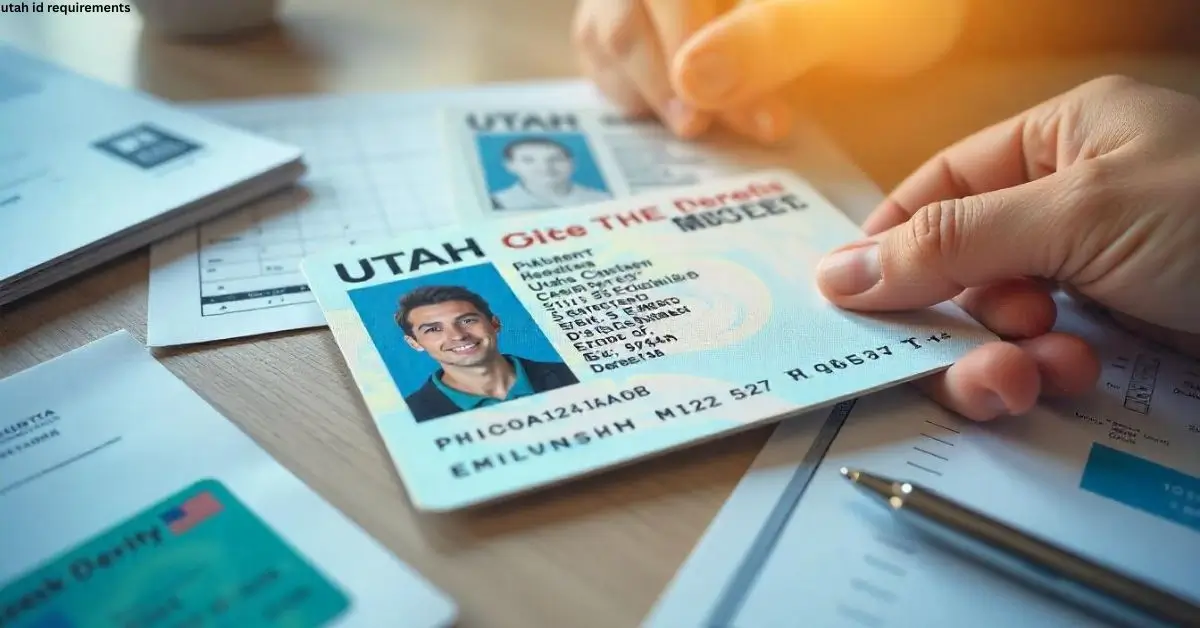GENERAL
Utah ID Requirements: Everything You Need to Know

Understanding Utah ID requirements is essential for residents and visitors alike, especially when it comes to activities such as voting, driving, banking, and accessing government services. Whether you are applying for a driver’s license, registering to vote, or proving your identity for travel, the right identification can make all the difference. This comprehensive guide will walk you through all aspects of Utah ID requirements, including accepted forms of identification, eligibility, costs, updates, and how Utah compares with other states.
What Are Utah ID Requirements?
Utah ID requirements refer to the documentation you must present to verify your identity, residency, and legal presence in the United States. These requirements vary depending on the purpose—whether for obtaining a Real ID-compliant driver’s license, non-driver identification card, or fulfilling legal identification in everyday situations such as buying alcohol, checking into a hotel, or dealing with law enforcement.
Legal Basis for Identification in Utah
According to the Utah Driver License Division (DLD), identification requirements are based on both federal and state laws. As of May 7, 2025, all individuals must possess a Real ID to board federally regulated commercial aircraft and access certain federal buildings. This makes it even more important to understand and comply with current Utah ID requirements.
Types of Acceptable ID in Utah
The state recognizes a wide range of documents that fulfill Utah ID requirements depending on the use case.
Primary ID Documents
These are essential for Real ID issuance:
- U.S. Passport (Valid)
- Certified birth certificate issued by a U.S. state
- Permanent Resident Card (Green Card)
- Employment Authorization Document
- Valid foreign passport with a visa and I-94 form
Secondary Supporting Documents
Often required to prove residency or identity:
- Social Security card
- Utility bill (within the past 60 days)
- Lease or rental agreement
- Bank statement (within 60 days)
- School transcript or report card
These documents help verify address and additional identity details in compliance with Utah ID requirements.
Real ID and Standard ID: What’s the Difference?
Real ID
A Real ID is federally compliant and includes a star in the upper right corner. It is required for:
- Boarding domestic flights
- Entering military bases
- Accessing federal facilities
Standard ID
A Standard ID may be issued to residents who do not want or qualify for a Real ID. It is valid only for driving and state-specific identification purposes and does not fulfill federal Utah ID requirements for travel.
How to Apply for a Utah ID
To apply, visit a Driver License Division office in Utah. The process includes following steps:
- Filling out an application form
- Providing the required documentation
- Passing a vision screening
- Paying the applicable fee
Applicants under age 18 may need parental consent and additional documents like school verification letters.
Utah ID Requirements by Category
For Driving
To obtain a driver’s license, applicants must provide:
- Proof of identity (e.g., passport or birth certificate)
- Proof of Social Security number (e.g., SSN card)
- Two documents verifying Utah residency (e.g., utility bills)
- Proof of lawful presence (if applicable)
For Voting
To register to vote in Utah, you must:
- Be a U.S. citizen
- Be a resident of Utah for at least 30 days
- Present valid ID, which may include a driver’s license or passport
Provisional ballots may be used if valid ID is not presented during registration.
For Alcohol and Tobacco Purchases
Acceptable forms under Utah ID requirements include:
- U.S. driver’s license
- U.S. military ID
- Passport (U.S. or foreign)
All must be unexpired and tamper-resistant.
For Public Benefits
When applying for public benefits (e.g., Medicaid, food stamps):
- Proof of identity
- Proof of Utah residency
- Proof of income
- SSN verification
All these documents must align with Utah ID requirements to avoid denial of benefits.
Cost Breakdown for Utah Identification
Here’s a comparison table that outlines key features of various ID types issued in Utah:
| ID Type | Cost | Validity | Efficiency | Ease of Use | Real ID Compliant |
| Driver’s License | $52.00 | 8 years | High | High | Yes (optional) |
| Non-driver ID Card | $23.00 | 8 years | Medium | High | Yes (optional) |
| Provisional License | $19.00 | 1 year | Medium | Moderate | No |
| Temporary ID | Free | 60 days | Low | Low | No |
| Learner’s Permit | $19.00 | 1 year | Medium | Moderate | No |
This table is based on the latest data from the Utah Driver License Division.
Tips to Ensure a Smooth ID Application Process
- Double-check document requirements before your appointment.
- Bring physical copies—digital versions are usually not accepted.
- Arrive early to minimize wait times.
- Use the DLD’s online checklist to ensure readiness.
Always call ahead or check the latest guidelines online to stay up to date with changing ID requirements.
Special Cases in Utah ID Requirements
Immigrants and Non-Citizens
Legal non-citizens can receive a Driving Privilege Card (DPC) with:
- ITIN number
- Proof of Utah residency
- Foreign passport
This card is not valid for federal identification purposes and is clearly marked as such.
Homeless Individuals
People without a permanent address can present a letter from a shelter or case manager as proof of residency. Utah’s inclusive ID policy helps support vulnerable populations while maintaining security.
Seniors and People with Disabilities
Special accommodations are available for seniors and disabled individuals applying for IDs, such as:
- Reduced fees
- Home visits in extreme cases
- Priority processing
These groups also receive guidance from local agencies regarding ID requirements specific to their needs.
How Utah ID Requirements Compare with Other States
Utah maintains a strict yet streamlined ID process compared to other states. Here’s how it stacks up:
- Efficiency: Utah’s online pre-application system saves time.
- Clarity: Requirements are published clearly and updated regularly.
- Security: Uses biometric verification and anti-fraud measures.
- Accessibility: Offers mobile units in rural areas.
In contrast, some states lag in real-time updates and digital services.
Security Measures in Utah IDs
Modern Utah IDs include:
- Holographic overlays
- Machine-readable zones (MRZ)
- Two-tone printing
- Laser engraving
These features align with federal security standards and make Utah IDs harder to forge.
Common Mistakes to Avoid
- Bringing expired or damaged documents
- Assuming digital copies will be accepted
- Providing only one proof of residency
- Overlooking the Real ID star symbol
- Not updating your address before applying
Avoiding these pitfalls ensures you meet the ID requirements on your first attempt.
What If You Lose Your Utah ID?
If your ID is lost or stolen you should carry out following initiatives:
- Report it immediately to local authorities.
- Apply for a replacement online or in person.
- Provide backup documentation (e.g., birth certificate or passport).
- Pay the applicable fee ($23 for a replacement driver’s license).
Lost IDs are treated seriously to prevent identity theft and fraud.
Conclusion
Understanding and complying with Utah ID requirements is crucial for accessing essential services, voting, driving, and ensuring your legal identity is protected. Whether you’re a new resident, a student, a senior, or someone just renewing their ID, preparation is key. Follow the guidelines, use checklists, and stay informed about the latest rules to make your ID application smooth and stress-free.
FAQs
What documents are required to get a Utah driver’s license?
To get a Utah driver’s license, you need proof of identity, SSN, legal presence, and two proofs of Utah residency.
Is Real ID mandatory in Utah?
Yes, starting May 7, 2025, a Real ID will be required for air travel and entering federal buildings.
Can immigrants apply for a Utah ID?
Yes, non-citizens can apply for a Driving Privilege Card with the appropriate documentation.
What is the cost of replacing a lost Utah ID?
The cost for a replacement driver’s license or ID in Utah is $23.
Can homeless individuals get a Utah ID?
Yes, with a residency verification letter from a shelter or case manager, they can apply.
How long does it take to receive a Utah ID?
You typically receive your ID by mail within 4 to 6 weeks after application.
GENERAL
The Blog About PocketMemoriesNet: A Complete Guide

In today’s digital world, capturing and preserving memories has become easier than ever. Whether it’s a cherished moment with family, an exciting vacation, or a special event, PocketMemoriesNet offers an innovative solution for memory storage and sharing. In this blog, we’ll delve into everything you need to know about the platform, its features, and how it’s revolutionizing the way we store our most precious memories.
The Blog About PocketMemoriesNet serves as an essential resource for users looking to get the most out of their experience with this unique memory storage platform. From tips on digital archiving to understanding how PocketMemoriesNet enhances user experience with its seamless design, this blog covers it all. Whether you’re a tech enthusiast, a family photographer, or someone who loves sharing memories, you’ll find valuable insights and practical advice in this blog.
What is PocketMemoriesNet?
PocketMemoriesNet is a digital platform designed to help users store, organize, and share their memories with ease. By combining cloud technology with user-friendly interfaces, the platform allows individuals to upload photos, videos, and even notes that capture significant life moments. What sets PocketMemoriesNet apart from other storage services is its focus on creating a personalized memory archive. This platform offers the ability to not only save memories but to relive them through its innovative features.
One of the core features of PocketMemoriesNet is its ability to categorize memories. You can organize them by event, location, or even by people involved. This makes it easy to navigate through your archive and quickly find that special moment. Moreover, the platform provides security, ensuring that your precious memories are safely stored in an encrypted cloud environment.
Key Features of the Blog About PocketMemoriesNet
When you dive into the blog about PocketMemoriesNet, you’ll find an array of features that make it stand out as a valuable resource. Here are some of the highlights:
1. Memory Preservation Guides
The blog features in-depth guides on how to preserve memories in the best possible way. These include tutorials on how to scan old photos, create video montages, and convert physical media into digital files. Whether you’re looking to preserve your childhood photos or create a digital album for a loved one, the blog provides practical tips and easy-to-follow instructions.
2. Tips for Organizing Digital Memories
A major challenge when it comes to digital storage is keeping everything organized. The blog covers several strategies to help you efficiently manage your memory collection. From using tags to sorting by date, you’ll find expert advice on how to categorize and retrieve memories with ease.
3. Technological Insights
PocketMemoriesNet is built on cutting-edge technology, and the blog regularly updates users on new advancements. Whether it’s about improving cloud security, integrating AI into memory search features, or exploring future updates, the blog ensures you’re always in the loop with the platform’s technological innovations.
4. Creative Ways to Share Memories
Apart from storing memories, sharing them with others is an essential part of the platform. The blog offers creative suggestions on how to share your moments with friends and family. Whether it’s creating a personalized memory book, sharing a slideshow, or posting a video, you’ll learn how to make the most of your shared memories.
5. User Stories & Experiences
The blog showcases inspiring stories from users who have shared how PocketMemoriesNet helped them preserve and share memories in unique ways. These real-life experiences give readers practical insights and ideas for how they can maximize the platform’s potential.
Why You Should Follow the Blog About PocketMemoriesNet
If you’re looking to enhance your experience with PocketMemoriesNet, following the blog is a must. Here are a few reasons why:
-
Expert Advice: The blog provides tips and tricks that can make managing your memories easier and more efficient.
-
Up-to-Date Information: Technology is always evolving, and the blog keeps you informed about new features, updates, and industry trends.
-
Community Engagement: By following the blog, you become part of a community that shares the same interest in preserving memories digitally.
-
Creative Inspiration: The blog gives you fresh, creative ideas for how to capture and share your memories in ways that are personal and meaningful.
How PocketMemoriesNet Benefits Users
PocketMemoriesNet isn’t just about storing memories; it’s about preserving them in a meaningful way. The platform offers several benefits that make it stand out from traditional storage options:
-
Security: With advanced encryption, you can be sure your memories are stored securely in the cloud.
-
Ease of Use: The user-friendly interface makes it easy for anyone, regardless of their tech skills, to upload, organize, and share memories.
-
Long-Term Preservation: Digital memories can last for generations, and PocketMemoriesNet ensures that your photos and videos remain accessible for years to come.
-
Collaboration: You can invite others to contribute to a memory album, making it a perfect tool for collaborative projects like family gatherings, weddings, or reunions.
Conclusion
The blog about PocketMemoriesNet is a treasure trove of information, tips, and inspiration for anyone interested in digital memory preservation. Whether you’re new to the platform or a seasoned user, there’s always something new to learn. From in-depth guides to user stories, the blog is a great place to explore all the ways PocketMemoriesNet can help you preserve and share your most cherished moments.
FAQs About PocketMemoriesNet
-
What kind of files can I upload to PocketMemoriesNet?
PocketMemoriesNet allows you to upload various types of files, including photos, videos, audio recordings, and text notes. This flexibility ensures you can preserve all forms of memories in one place. -
How does PocketMemoriesNet keep my memories safe?
PocketMemoriesNet uses state-of-the-art encryption and cloud backup systems to protect your memories. This ensures that your data is both secure and easily accessible whenever you need it. -
Can I access PocketMemoriesNet on mobile devices?
Yes, PocketMemoriesNet offers a mobile app that allows you to access, upload, and organize your memories on the go. The app is available for both iOS and Android devices. -
How can I share memories with friends and family on PocketMemoriesNet?
You can share your memories by creating private albums, sharing links, or even sending digital memory books. The platform allows you to invite others to contribute to your albums, making it easy to collaborate on shared memories. -
Is there a limit to how many memories I can store on PocketMemoriesNet?
PocketMemoriesNet offers different storage plans depending on your needs. Whether you’re storing a few photos or a large collection of videos, there’s a plan that fits your requirements, with no cap on the number of memories you can upload.
GENERAL
Wollmatten: Nature’s Comfort Underfoot – A Comprehensive Guide

In an era where sustainability, wellness, and natural materials are increasingly valued, Wollmatten—German for “wool mats” or “wool floor coverings”—are experiencing a well-deserved renaissance. Far more than simple floor décor, Wollmatten represent a harmonious blend of tradition, functionality, and environmental responsibility. Whether used as underlays beneath carpets, as standalone rugs, or as insulating layers in construction, these wool-based products offer a wide array of benefits that synthetic alternatives struggle to match.
This article explores Wollmatten in depth: their history and origins, materials and manufacturing, functional advantages, applications in modern living and building, care and maintenance, environmental impact, and how to choose the right type for your needs. By the end, you’ll understand why Wollmatten are not just a niche product—but a smart, sustainable choice for homes, offices, and even historical restoration projects.
What Are Wollmatten?
Wollmatten literally translates from German as “wool mats.” While the term can be used broadly, it most commonly refers to dense, felted, or woven mats made primarily from sheep’s wool—often 100% natural wool, though some blends may include small amounts of natural fibers like jute or cotton for added structure.
Unlike plush carpets or decorative rugs, Wollmatten are typically utilitarian in nature: firm, flat, and designed for performance rather than ornamentation. They range in thickness from thin underlays (2–5 mm) to substantial insulation mats (up to 20 mm or more). Their texture can vary from tightly compressed needle-punched felt to loosely layered batts, depending on the intended use.
Historically, wool mats were used in cold climates across Europe—particularly in Germany, Scandinavia, and the Alpine regions—as insulating floor layers beneath wooden planks or stone slabs. Their natural resilience and thermal properties made them ideal for drafty homes and traditional timber-frame buildings.
The Natural Advantage: Why Wool?
To understand the enduring value of Wollmatten, one must first appreciate the remarkable properties of wool itself—nature’s high-performance fiber.
1. Thermal Insulation
Wool fibers are crimped and scaly, creating countless tiny air pockets that trap heat. This makes wool an excellent insulator, whether used in clothing, bedding, or flooring. A layer of Wollmatten beneath a floor can significantly reduce conductive heat loss—especially over unheated basements, crawl spaces, or concrete slabs.
Studies have shown that wool underlays can improve a floor’s U-value (a measure of heat transfer) by up to 20–30%, contributing meaningfully to energy efficiency.
2. Moisture Regulation
Wool can absorb up to 30% of its weight in moisture vapor without feeling damp—a property known as hygroscopic buffering. When humidity rises, Wollmatten absorb excess moisture; when the air dries, they release it. This helps regulate indoor climate, prevent condensation, and inhibit mold growth—especially vital in older buildings with poor ventilation.
3. Sound Absorption
The dense, fibrous structure of wool effectively dampens impact noise (footsteps, dropped objects) and airborne sound. Wollmatten used as underlays beneath hardwood or laminate floors can reduce noise transmission between floors by 10–15 dB—making them a quiet, neighbor-friendly choice in multi-family dwellings.
4. Durability and Resilience
Wool fibers are naturally elastic and can bend over 20,000 times without breaking. This resilience allows Wollmatten to maintain thickness and performance over decades, resisting compression that plagues synthetic foams.
5. Flame Resistance
Wool is inherently flame-retardant, with a high ignition temperature (~570–600°C) and low flame spread. It chars rather than melts and does not release toxic fumes when exposed to fire—making Wollmatten a safer option in buildings where fire safety is a priority.
6. Biodegradability & Non-Toxicity
Unlike petroleum-based synthetics, wool is renewable, compostable, and free from volatile organic compounds (VOCs). High-quality Wollmatten contain no adhesives or chemical binders—just pure, cleaned wool, sometimes held together mechanically (e.g., via needle punching).
How Wollmatten Are Made
The production of authentic Wollmatten is a blend of craftsmanship and modern engineering. While methods vary by manufacturer, the core process remains rooted in traditional wool processing.
Step 1: Sourcing and Cleaning
Raw wool—often from regional sheep breeds—is first graded and washed (scoured) to remove lanolin, dirt, and vegetable matter. Some producers use eco-friendly, biodegradable detergents and reclaim water to minimize environmental impact.
Step 2: Carding
The cleaned wool is passed through carding machines, which align the fibers into a uniform web. This step removes tangles and ensures consistency.
Step 3: Mat Formation
There are two primary methods to form the mat:
- Needle-Punching: Barbed needles repeatedly pierce the wool web, mechanically entangling fibers into a dense, cohesive felt. This creates strong, dimensionally stable Wollmatten ideal for underlays and insulation.
- Layering & Compression: Multiple layers of loose wool are stacked and then pressed (sometimes with gentle steaming or moisture) to form batts. These are softer and more commonly used for acoustic or thermal insulation in walls or ceilings—but can also serve as thick floor underlays.
Step 4: Finishing
Mats may be trimmed to standard widths (e.g., 1m or 1.5m rolls), cut to length, and rolled for shipping. High-end Wollmatten undergo quality testing for thickness, density, and performance metrics.
Note: Truly natural Wollmatten contain no synthetic binders, glues, or backing. If a product lists polypropylene, latex, or PVC, it is not a pure wool mat—even if wool is the primary fiber.
Key Applications of Wollmatten
Wollmatten are remarkably versatile. Their uses span residential, commercial, and heritage contexts:
1. Floor Underlays
The most common use: placing Wollmatten beneath hardwood, engineered wood, laminate, or carpet.
- Under hardwood: improves warmth, reduces hollow sounds (“drumming”), and protects subfloors.
- Under carpet: enhances comfort, extends carpet life, and boosts acoustic and thermal performance.
- In renovation: ideal for retrofitting insulation into older homes without raising floor levels excessively.
2. Thermal and Acoustic Insulation
In sustainable and passive-house construction, Wollmatten are used:
- Between floor joists (as batt insulation)
- As interstitial layers in timber-frame walls
- Beneath screed in radiant floor heating systems (wool’s low thermal conductivity ensures even heat distribution)
Because wool doesn’t off-gas and supports healthy indoor air quality, it’s favored in wellness-focused building standards like WELL Building or natureplus certification.
3. Historical Restoration
Authentic restoration of pre-20th-century buildings often mandates natural materials. Wollmatten replicate the insulating layers found in traditional German Fachwerkhäuser (half-timbered houses) or Alpine chalets—making them indispensable for heritage conservation.
4. Yoga & Wellness Spaces
Some studios use thin, washable Wollmatten as natural, non-slip surfaces for yoga or meditation. Their breathability and grounding texture offer a tactile alternative to PVC or rubber mats.
5. Agricultural & Equestrian Uses
Thick Wollmatten serve as stall bedding for horses—absorbing moisture, reducing ammonia, and providing cushioning. Though less common, this application highlights wool’s durability and hygienic qualities.
Comparing Wollmatten to Synthetic Alternatives
Let’s contrast Wollmatten with common synthetic floor underlays:
The data is clear: while foam underlays may be cheaper upfront, Wollmatten offer superior long-term value—especially when health, sustainability, and performance are prioritized.
Installation Tips for Wollmatten
Proper installation ensures optimal performance:
- Subfloor Prep: Ensure the subfloor is clean, dry, and level. Repair cracks or unevenness first.
- Overlap & Seal: For insulation-grade Wollmatten, overlap seams by 5–10 cm and tape with paper or wool-compatible tape to prevent thermal bridging.
- Expansion Gaps: Leave 1–2 cm at walls for natural expansion (especially in humid conditions).
- No Adhesives Needed: Most Wollmatten are loose-laid. Avoid solvent-based glues—opt for mechanical fastening if required.
- Compatibility Check: Confirm compatibility with your flooring system. For radiant heating, verify maximum temperature tolerance (most wool mats handle ≤40°C surface temps safely).
Pro Tip: In damp environments (e.g., basements), pair Wollmatten with a vapor-permeable membrane—not a plastic vapor barrier—to preserve wool’s moisture-buffering ability.
Maintenance and Longevity
One of the great advantages of Wollmatten is their low-maintenance nature—particularly when used as underlays (where they remain hidden and undisturbed).
- Under floor coverings: Require no active maintenance. Their lifespan often exceeds that of the flooring above—50+ years is achievable in dry, stable conditions.
- Exposed Wollmatten (e.g., rugs): Vacuum regularly. Spot-clean with mild wool detergent and lukewarm water. Avoid soaking. Air-dry flat, away from direct heat.
Wool’s natural lanolin residue (in minimally processed mats) provides mild insect resistance, but long-term storage should include natural repellents like cedar or lavender—not mothballs.
Sustainability & Ethical Considerations
Wool is a renewable resource: sheep regrow their fleece annually. When sourced responsibly, Wollmatten support regenerative agriculture—especially if wool comes from farms practicing rotational grazing, animal welfare (e.g., ZQ Merino or GOTS-certified wool), and local processing.
However, not all wool is equal:
- Avoid wool from mulesing practices (common in some Australian Merino).
- Look for certifications: GOTS (Global Organic Textile Standard), IVN Best, or natureplus.
- Regional wool (e.g., German, Austrian, or Scandinavian) reduces transport emissions and supports small-scale farmers.
At end-of-life, pure Wollmatten can be composted (in industrial facilities) or repurposed—for example, as garden mulch (wool suppresses weeds and slowly releases nitrogen).
Choosing the Right Wollmatten
Not all Wollmatten are identical. Consider these factors:
Reputable European brands include Höpfer, Baudisol, Woolfloor, and Ecoflor—though local wool cooperatives may offer custom options.
The Future of Wollmatten
As green building codes tighten and consumers demand healthier living environments, Wollmatten are poised for growth. Innovations include:
- Hybrid mats with hemp or flax fibers for enhanced rigidity.
- Modular Wollmatten with interlocking edges for DIY installation.
- Smart integration: Embedding temperature/humidity sensors for building analytics (still experimental).
Architects and interior designers are rediscovering wool not just for its function—but for its aesthetic honesty: a material that ages gracefully, tells a story, and connects us to natural cycles.
Conclusion: Why Wollmatten Matter
Wollmatten are more than floor coverings. They are a testament to how traditional materials, when understood and applied thoughtfully, can meet modern demands for health, efficiency, and sustainability. In a world saturated with plastics and short-lived products, Wollmatten offer longevity, safety, and quiet dignity.
They keep homes warm in winter and cool in summer. They muffle noise without stifling breath. They decompose kindly when their long service ends. And—importantly—they support ethical farming and local craftsmanship.
Whether you’re renovating a century-old home, building a passive house, or simply seeking a healthier, more grounded living space, Wollmatten deserve serious consideration. Their eightfold mention in this article isn’t arbitrary—it’s an invitation: to look closer, to choose wisely, and to step—quite literally—into a more natural way of living.
Investing in Wollmatten isn’t just about flooring. It’s about laying a foundation—for comfort, for conscience, and for the future.
GENERAL
Auxiliaries of Thailand’s DMD Company: A Comprehensive Overview

When discussing the auxiliaries of Thailand’s DMD Company, it’s important to first understand what “auxiliaries” means in a corporate context. In essence, auxiliaries refer to the supporting units, services, and subsidiary functions that enable the core business to operate efficiently. In Thailand, for the company known as DMD Industries Company Limited (and related “DMD” entities), these auxiliaries play a significant role in logistics, production support, quality assurance, and export operations. This article provides a detailed and easy-to-understand breakdown of how those auxiliaries function, why they matter, and the benefits and challenges associated with them.
1. What are the auxiliaries of Thailand’s DMD Company?
The auxiliaries of Thailand’s DMD Company refer to the set of internal and external support functions that complement the company’s main business activities—namely manufacturing, supply chain management, export logistics, after-sales support and related administrative services. For example, while DMD Industries Co., Ltd. is listed as a manufacturer of automobile parts and supplies in Thailand. The auxiliary units could include the following:
-
Logistics and warehousing operations that ensure parts move smoothly.
-
Quality control and certification services to meet export standards.
-
After-sales, customer support and technical servicing teams.
-
Administration: HR, finance, procurement that support the production units.
In other words, these auxiliary functions provide the backbone that enables the core manufacturing business to perform without interruption.
2. Why the auxiliaries are important for DMD in Thailand
The importance of the auxiliaries of Thailand’s DMD Company can be understood from multiple angles:
Operational Efficiency
Without reliable support services, the manufacturing line can face delays. For DMD, auxiliary services such as parts logistics, tooling maintenance, and inspection ensure that production flows without bottlenecks.
Export & Quality Compliance
If the company exports components or supplies, auxiliary functions such as quality assurance, documentation services and compliance with standards are essential. Given Thailand’s role in regional automotive supply chains, these auxiliaries become critical. For instance, Thailand’s motorcycle parts industry is projected to grow by 7-9 % annually, and supporting services are key.
Cost Management
Well-managed auxiliary functions can reduce overhead, improve turnaround times, and thus lower cost per unit. This further strengthens DMD’s competitiveness in Thailand and abroad.
Risk Mitigation
Having dedicated support functions helps mitigate risks such as supply chain disruptions, part defects, regulatory non-compliance, or downtime. The auxiliaries of Thailand’s DMD Company therefore play a risk management role as well.
3. Key Categories of Auxiliaries at DMD Thailand
We can group the auxiliaries of Thailand’s DMD Company into three broad categories:
| Category | Description | Role in DMD context |
|---|---|---|
| Production Support | Tooling maintenance, equipment servicing, inspection labs | Ensures manufacturing nuts & bolts are functioning. |
| Logistics & Supply Chain | Warehousing, inbound/outbound transport, inventory management | Facilitates smooth flow of raw materials and finished goods. |
| Administrative & Compliance | HR, finance, export documentation, quality control, regulatory compliance | Keeps the business legal, efficient and globally viable. |
Each of these plays a crucial role when taken together. For instance, production support must coordinate with logistics so that replacement parts arrive just-in-time, which in turn may require administrative scheduling and compliance checks.
4. How these auxiliaries operate in the Thai industrial context
In Thailand, manufacturing companies like DMD rely on a network of both internal units and external third-party providers for auxiliary services. The auxiliaries of Thailand’s DMD Company typically operate as follows:
-
The internal unit may schedule tooling maintenance or machine calibration, using an in-house team or a partner service provider.
-
Logistics auxiliaries coordinate with the Thailand Industrial Estate transport network, customs for export, and freight carriers for international shipments.
-
Administrative auxiliaries compile necessary export documents, manage certifications (e.g., ISO, TISI), and keep track of compliance with Thai labour and environmental regulations.
Because Thailand is a hub for automotive supply chains, the operations of these auxiliaries must be tightly integrated. The success of DMD’s manufacturing output depends on how well these supporting functions align.
5. Benefits and Impact of Strong Auxiliary Functions
When the auxiliaries of Thailand’s DMD Company are well structured and managed, several benefits follow:
-
Improved productivity: fewer production halts, better equipment uptime, faster delivery times.
-
Enhanced market access: smoother export operations mean access to global markets and less risk of delays.
-
Better cost control: efficient inventory and logistics help reduce waste and excess cost.
-
Stronger reputation: consistent output and quality support build trust among OEMs and clients.
-
Resilience: well-managed support functions help the firm respond to supply shocks or demand surges.
The cumulative impact is that DMD is better positioned to compete in Thailand’s dynamic manufacturing environment.
6. Challenges & Considerations
Despite the importance of auxiliaries, there are several challenges the company may face:
-
Coordination complexity: multiple auxiliary functions must integrate seamlessly; failures or misalignment (e.g., logistics delay) can ripple into production.
-
Cost pressure: auxiliaries add cost overhead; balancing cost savings with high service quality is tricky.
-
Regulatory compliance: Thailand’s regulatory environment can change; auxiliary functions must stay up to date with labour laws, environmental rules, export documentation etc.
-
Skilled manpower: running maintenance, logistics and compliance requires skilled staff; shortage of these can hamper auxiliary performance.
-
Technology integration: digital tracking, real-time inventory systems and automation are becoming key; migrating auxiliaries to modern tech requires investment.
Acknowledging these challenges helps in shaping how the auxiliaries of Thailand’s DMD Company should be managed and improved over time.
7. Practical Recommendations for Optimising Auxiliaries at DMD
To ensure that the auxiliaries of Thailand’s DMD Company deliver maximum value, the company should focus on a few practical levers:
-
Map and document processes: define clear workflows for each auxiliary function and how they interface with production lines.
-
Implement KPIs: for example, mean time to repair (for tooling maintenance), on-time logistics delivery rate or export document error rate.
-
Invest in training: upskilling staff in maintenance, supply chain tech and compliance.
-
Use technology: adopt ERP modules, logistics tracking systems and predictive maintenance tools to modernise auxiliary functions.
-
Regular review and audit: internal audits of auxiliary performance, supplier reviews in logistics, root cause analysis of downtime events.
-
Foster collaboration: ensure auxiliary teams engage with production, procurement and sales to align objectives and reduce silos.
These steps will help the integral supporting roles — the auxiliaries of Thailand’s DMD Company — to become strategic enablers rather than mere cost centers.
Conclusion
In summary, the auxiliaries of Thailand’s DMD Company represent the vital support ecosystem that enables the core manufacturing business to function effectively. From logistical support to quality compliance, from tooling maintenance to administrative operations, these functions ensure production remains smooth, cost-efficient and compliant with the demands of both domestic and export markets. For DMD Industries Co., Ltd., and any similar manufacturing entity in Thailand, investing in and optimising these auxiliary functions is not optional—it’s a strategic necessity if the company wishes to maintain competitiveness, meet global standards and respond resiliently to change.
FAQs
Q1: What is meant by “auxiliary function” in manufacturing?
Auxiliary functions are the supporting services and units—such as logistics, maintenance, quality control—that enable the core manufacturing operations.
Q2: Are auxiliaries outsourced or in-house for DMD in Thailand?
They can be both: some auxiliaries are managed internally, others are provided by external specialist service providers.
Q3: How do auxiliaries impact export business of DMD?
They enable timely documentation, packaging, logistics and quality assurance—critical for smooth export flow and compliance.
Q4: Can weak auxiliary functions reduce competitiveness?
Yes—poorly managed auxiliaries lead to delays, cost overruns and quality issues, undermining competitiveness.
Q5: How often should auxiliary functions be reviewed or audited?
Ideally on a regular basis, such as quarterly or semi-annually, to ensure they remain aligned with production and business objectives.
-

 GENERAL3 months ago
GENERAL3 months agoRobert Hubbell Wikipedia: What’s His 2025 Biography Guide?
-

 EDUCATION6 months ago
EDUCATION6 months agoJay Kuo Substack: Unpacking the Voice of Legal Insight
-

 GENERAL6 months ago
GENERAL6 months agoDream Cake: A Decadent Delight Worth Savoring
-

 GENERAL6 months ago
GENERAL6 months agoChris Hedges Substack: A Voice of Dissent in the Digital Age
-

 EDUCATION6 months ago
EDUCATION6 months agoEconomic Blackout Results: The Financial Domino Effect
-

 TECHNOLOGY6 months ago
TECHNOLOGY6 months agoHow to Cancel Substack Subscription
-

 GENERAL6 months ago
GENERAL6 months agoMax Azzarello Substack: Inside the Mind of a Radical Truth-Seeker
-

 ENTERTAINMENT5 months ago
ENTERTAINMENT5 months agoTyler the Creator Dad Truth
